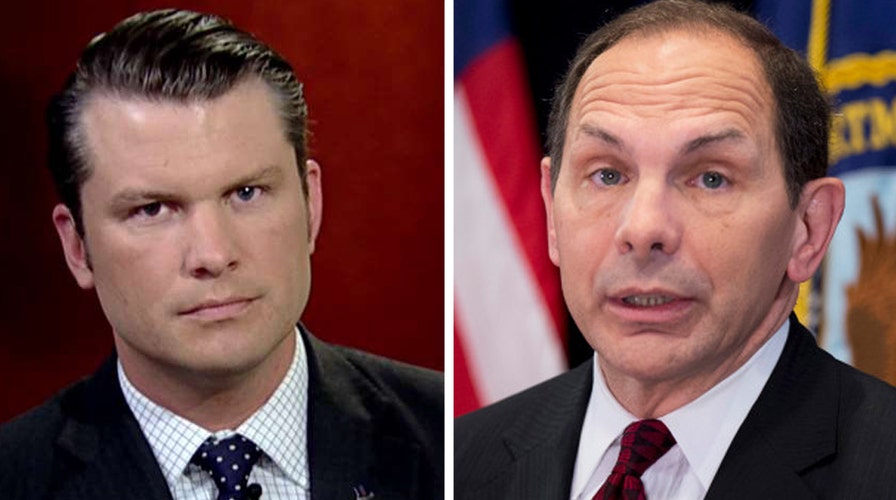Pete Hegseth: VA Secretary is in a bubble
Veteran and 'In the Arena' author Pete Hegseth provides insight
As veterans of foreign wars, we have both witnessed firsthand the incredible bravery and sacrifice our warfighters have made in service to our American experiment – one of us during the Iraq War, the other a generation before in Vietnam.
These veterans, and millions of other brave men and women just like them, immediately came to mind when the scandal of delayed and denied care at the Phoenix VA broke two years ago. Lest we forget, the VA scandal is ultimately a human scandal – with tragic consequences for too many of America’s finest.
Outrage and an effort to correct this unthinkable breach of trust were quick to follow, resulting in several investigations and some of the most significant VA reform in decades, in particular, the VA Choice Card program.
A disinterested White House and an obstructionist VA bureaucracy have been slow to implement them. Addressing continuing reticence in the law’s implementation require that we redouble our efforts to ensure veterans receive quality and timely care now, with an eye toward future steps that will address the systemic problems preventing the VA from being a source of national pride, not shame.
First, we have to make the existing VA system more responsive to veterans’ needs by extending hospital, clinic and pharmacy hours on evenings and weekends. This would ensure that working veterans can visit the VA without having to take time off (oftentimes unpaid) from their jobs. It would also open up thousands of new appointment slots.
The VA should also expand a pilot program that lets veterans get care at walk-in clinics without an appointment across the country. These commonsense reforms would provide veterans the same variety of care that civilians have had access to for years.
Another crucial and immediate step is accountability. We now know that many VA bureaucrats made selfish decisions that delayed and denied care to veterans, leaving veterans to languish on secret waitlists. Under needlessly generous civil service rules, many VA employees who were originally fired for wrongdoing have since been reinstated at the VA. In some cases, corrupt executives were even promoted.
On accountability, recent legislative developments would have us move in the wrong direction. Just a few days ago, the Senate Veterans Affairs Committee passed the Veterans First Act, which it heralded as a “groundbreaking bill” that would bring needed accountability reform to VA.
Unfortunately, it will not.
The bill, for example, contains provisions that would frustrate the VA’s ability to hold officials truly accountable for wrongdoing by keeping in place numerous layers of bureaucratic protections that insulate VA employees subject to discipline for mediocre performance or harmful misconduct.
The bill would also merely encourage the Merit Systems Protection Board (MSPB) to act within 90 days of an appeal from a VA employee—without any consequence for failing to do so. As we have seen, failing to enact effective accountability laws will lead to an endless process where bad employees are left in place and veterans suffer the consequences.
For months, the Senate has delayed moving much stronger veterans’ accountability reform legislation that the House of Representatives strongly supported simply because a small minority of Senators are siding with VA bureaucrats and government unions over veterans. These opponents should publicly explain why, when it comes to serious misconduct, a VA health care employee who makes decisions that undermine the health or safety of our veterans should be treated under the same civilian service rules that apply to employees at the Department of Education or the IRS. It is past time for the Senate to pass real accountability for all VA employees.
In addition to accountability, we have to do more to improve healthcare flexibility and choice for veterans who want, and need, more options.
The 2014 VA reform legislation created a pilot Veterans Choice Card program that allows veterans waiting more than 30 days for an appointment (or who live more than 40 miles far from a VA facility) see a private health care provider of their choice in their community. Implementation of the Choice Card has not been perfect—but, undeterred, veterans still clamor for a real choice.
Today, more than 100,000 veterans per month choose to use the Choice Card rather than languishing on the VA’s never-ending wait lists. But, under current law, the pilot Choice Card program is set to expire next year. It’s critical that, along with other adjustments, we make this program both permanent and universal so that all eligible veterans—regardless of where they live—have the flexibility to access the doctor of their choice. The American people overwhelmingly agree, with more than 90 percent of Americans saying that veterans should be able to go to any doctor in America that accepts Medicare.
In the coming year, Congress must address the need for extensive structural reform at the VA health care system. One such promising reform (coming soon in the House) includes separating the VA’s hospitals and clinics from its administrative staff that handle payments for veterans for their care in the community. We believe this separation would help the VA focus on improving the overall delivery of health care and ensure true choice for veterans.
The shadow of the 2014 VA scandal continues to loom over our nation every day, as it should. While we have made some important steps in a long journey of reforming the VA, we cannot stop now. There are common-sense and widely supported reforms that can and will improve the VA. We must seize the opportunity to institute major and systemic reform so that we can finally fulfill our moral obligation to our veterans by ensuring that they receive the care they deserve.

